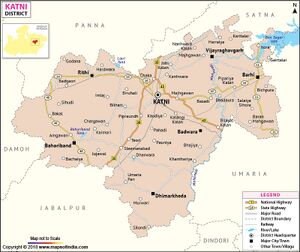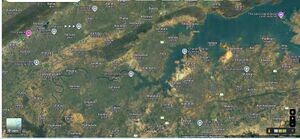Karitalai
| Author: Laxman Burdak IFS (R) |



Karitalai (कारीतलाई) is village in Vijayraghavgarh tahsil of Katni district in Madhya Pradesh.
Location
Karitalai is located in Vijayraghavgarh tahsil near the north-east border of Katni district in Madhya Pradesh.
Variants
- Kari Talai (कारीतलाई)/Karitalai (कारीतलाई) (जिला जबलपुर, म.प्र.) (AS, p.173)
- Chhandopallika (छंदोपल्लिक) (AS, p.348)
History
Karitalai Stone inscription is the earliest official record of Kalachuris of Tripuri. Northern Kalachuris ruled in central India with its base at the ancient city of Tripuri (Tewar); it originated in the 8th century, expanded significantly in the 11th century, and declined in the 12th–13th centuries.
Vishnu varah temple located at Karitalai / Karanpur in Vijayraghavgarh town of Katni district is a big archaelogical site. It is an important heritage of Katni and is being protected by Govt Tourism. The Varah is great and Kachha (tortoise) and Machha (fish) are too good. There is a nice Shivling and beautiful sculptures of other hindu gods.
कारीतलाई
कारीतलाई (जिला जबलपुर मध्य प्रदेश) - विजयेन्द्र कुमार माथुर[1] ने लिखा है....कारीतलाई (AS, p.173) कटनी के निकटवर्ती इस स्थान से महाराजा जयनाथ का एक गुप्तकालीन ताम्रदानपट्ट प्राप्त हुआ था जिसमें उनके द्वारा छंदोंपल्लिक नामक ग्राम का कुछ ब्राह्मणों को दान में देने का उल्लेख है. यह दानपट्ट उच्चकल्प से प्रचलित किया गया था. 1879 ई. में जनरल कनिंघम ने इस स्थान के प्राचीन अवशेषों का उल्लेख किया था. उन्होंने यहां श्वेत पत्थर की नरसिंह भगवान की एक विशालकाय मूर्ति देखी थी जिसका अब पता नहीं है. यहां से प्राप्त मूर्तियों में दशावतार, सूर्य, महावीर, गणेश तथा कुछ जैन संप्रदाय की मूर्तियां हैं जो अधिकांश में कलचुरी कालीन हैं.
छंदोपल्लिक
छंदोपल्लिक (AS, p.348) - छंदोपल्लिक गुप्त काल में कारीतलाई (जबलपुर ज़िला, मध्य प्रदेश) के निकट स्थित एक ग्राम था। छठी शती ई. में महाराज जयनाथ द्वारा उच्छकल्प से जारी किए गए एक ताम्र दानपट्ट में इस ग्राम को कुछ ब्राह्मणों के लिए दान में दिए जाने का उल्लेख है।[2]
Karitalai Copper-plate Inscription of the Maharaja Jayanatha (493-494 CE)
- Ôm! Hail! From (the city or hill of) Uchchakalpa; — (There was) the Mahârâja Ôghadêva. His son, who meditated on his feet, (was) the Mahârâja Kumâradêva, begotten on the Mahâdêvi Kumâradêvi. His son, who meditated on his feet, (was) the Maârâja Jayasvâmin, begotten on the Mahâdêvi Jayasvâmini. His son, who meditated on his feet, (was) the Mahârâja Vyâghra, begotten on the Mahâdêvi Râmadêvi.
- (Line 4.)— His son, who meditates on his feet, the Mahârâja Jayanâtha,— begotten on the Mahâdêvi Ajjhitadêvi, — being in good health, issues a command to the cultivators, beginning with the Brâhmans, and to the artisans, at (the village of) Chhandâpallikâ in the Nâgadêya santaka: —
- (L. 6.)— "Be it known to you that, for the purpose of increasing my own religious merit, this village is granted by me,— with the udranga and the uparikara, (and with the privilege that it is) not to be entered by the irregular or the regular troops, (but) with the exception of (the right to fines imposed on) thieves,— to the Brâhman Mitrasvâmin, of the Kânva gôtra and the Vâjasanêya-Mâdhyamdina (shâkhâ).
- (L. 9.)— "You yourselves shall render to him the offering of the tribute of the customary royalties and taxes, and shall be obedient to (his) commands.
- (L. 10.)— "And those kings who shall be born in Our lineage,— by them this grant should not be confiscated, (but) should be assented to; (and) the tribute of the taxes which by custom should not belong to the king, should not be taken.
- (L. 12.)— "And whosoever may confiscate this grant,— he shall become invested with (the guilt of) the five great sins and the minor sins."
- (L. 13.)— And it has been said in the Mahâbhârata by the venerable Vyâsa,— "O Yudhishthira, best of kings, carefully preserve land that has been given, whether by thyself or by another; (verily) the preservation (of a grant) (is) more meritorious than making a grant! The earth has been enjoyed by many kings, commencing with Sagara; whosoever at any time possesses the earth, to him belongs, at that time, the reward (of this grant that is now made, if he continue it)! As a rule, indeed, no inauspicious condition is experienced by kings; but they are purified for ever, when they bestow land! The giver of land enjoys happiness in heaven for sixty thousand years; (but) the confiscator (of a grant), and he who assents (to an act of confiscation), shall dwell for the same number of years in hell! Fathers (in the world of the dead) clap their hands upon their arms, (and) grandfathers leap (from joy), (saying)— ‘A giver of land has been born in our family; he shall become our deliverer’! He who confiscates land, rich in all (kinds of) grains, (that has been granted),— he becomes a worm in the ordure of a dog, and sinks (into hell), together with (his) ancestors!"
- (L. 21.)— In a century of years, together with the seventy-fourth (year), on the fourteenth day of the month Âshâdha,— on this (lunar day), (specified) as above by the day (&c.),— (this charter) has been written by me, the Bhôgika Guñjakirtti, the grandson of the Bhôgika, the Amâtya Râjyila, and the son of the Bhôgika Dhruvadatta. The Dûtaka (is) the Uparika, Dîkshita, householder, and chief of architects, Sharvadatta.
- (L. 24.) — The year 100 (and) 70 (and) 4; (the month) Âshâdha; the day 10 (and) 4.
- From: Fleet, John F. Corpus Inscriptionum Indicarum: Inscriptions of the Early Guptas. Vol. III. Calcutta: Government of India, Central Publications Branch, 1888, 119-120.
External links
References
Back to Jat Villages

